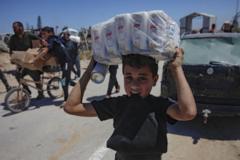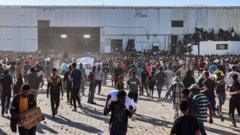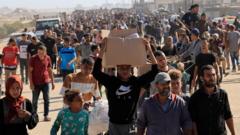The Gaza Humanitarian Foundation (GHF), a newly established group backed by the U.S. and Israel, has initiated its aid distribution efforts in Gaza. Despite facing significant controversy and resistance from established humanitarian organizations, GHF announced that it has begun delivering food supplies to designated "Secure Distribution Sites" across the region. This comes in response to a dire humanitarian crisis resulting from an Israeli blockade that has severely limited access to essential supplies.
New Controversial US-Backed Aid Group Begins Operations in Gaza

New Controversial US-Backed Aid Group Begins Operations in Gaza
A new aid organization, the Gaza Humanitarian Foundation, starts distribution amidst mounting tensions in Gaza.
The GHF confirmed on Monday that food-laden trucks had successfully reached these sites, though specifics on the quantity of aid distributed or the number of beneficiaries remained undisclosed. The organization, which employs armed American security personnel, aims to bypass the United Nations, which traditionally serves as the primary channel for aid to the 2.1 million Palestinians in Gaza. Experts, however, have raised alarms about the potential for famine in the region as a result of ongoing conflicts.
In a public statement, GHF revealed that more aid convoys are expected to arrive daily, with the goal of feeding over a million Palestinians within the week. However, the UN and several humanitarian groups have explicitly refused to cooperate with GHF, condemning their approach as inconsistent with humanitarian principles. They argue that GHF’s strategy could further complicate aid access for the most vulnerable populations, including the elderly and disabled.
Amidst the turmoil, GHF outlined that beneficiaries will be allowed to collect food and basic hygiene items from a limited number of secure sites in southern Gaza, monitored by American contractors with Israeli military oversight. Critics, including UN officials, have pointed out that logistical challenges and the exclusion of individuals with mobility issues pose significant barriers to equitable aid distribution.
Hamas has countered the establishment of GHF, claiming its operations would lead to chaos and starvation among Palestinians. The group's statement condemned Hamas for allegedly threatening aid workers and obstructing access to aid.
In context, Israel's comprehensive blockade on humanitarian aid, which began on March 2, escalated following a military offensive aimed at compelling Hamas to release hostages. The Israeli military's ongoing efforts reportedly include forced displacement and strict controls on aid entry, with significant international pressure leading to limited concessions.
Despite some aid deliveries, experts estimate that hundreds of thousands in Gaza could face starvation without an urgent increase in humanitarian assistance. The GHF's controversial methods and independence from traditional humanitarian frameworks continue to stoke heated debates about the future of aid in conflict zones like Gaza, necessitating immediate attention to the growing crisis.
In a public statement, GHF revealed that more aid convoys are expected to arrive daily, with the goal of feeding over a million Palestinians within the week. However, the UN and several humanitarian groups have explicitly refused to cooperate with GHF, condemning their approach as inconsistent with humanitarian principles. They argue that GHF’s strategy could further complicate aid access for the most vulnerable populations, including the elderly and disabled.
Amidst the turmoil, GHF outlined that beneficiaries will be allowed to collect food and basic hygiene items from a limited number of secure sites in southern Gaza, monitored by American contractors with Israeli military oversight. Critics, including UN officials, have pointed out that logistical challenges and the exclusion of individuals with mobility issues pose significant barriers to equitable aid distribution.
Hamas has countered the establishment of GHF, claiming its operations would lead to chaos and starvation among Palestinians. The group's statement condemned Hamas for allegedly threatening aid workers and obstructing access to aid.
In context, Israel's comprehensive blockade on humanitarian aid, which began on March 2, escalated following a military offensive aimed at compelling Hamas to release hostages. The Israeli military's ongoing efforts reportedly include forced displacement and strict controls on aid entry, with significant international pressure leading to limited concessions.
Despite some aid deliveries, experts estimate that hundreds of thousands in Gaza could face starvation without an urgent increase in humanitarian assistance. The GHF's controversial methods and independence from traditional humanitarian frameworks continue to stoke heated debates about the future of aid in conflict zones like Gaza, necessitating immediate attention to the growing crisis.




















